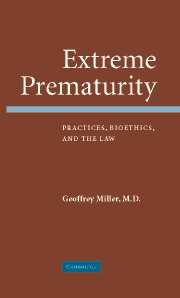Book contents
- Frontmatter
- Contents
- Part 1 THE EXTREMELY PRETERM INFANT: EPIDEMIOLOGY, PERCEPTIONS, AND PRACTICES
- Part 2 BIOETHICS
- Part 3 REPORTS, OFFICIAL OPINIONS, AND GUIDELINES
- Part 4 THE LAW
- 30 Introduction
- 31 U.S. Law
- 32 The United Kingdom
- 33 Canada
- 34 Australia
- 35 Japan
- 36 Italy, Germany, and Poland
- 37 France
- 38 The Netherlands
- Part 5 EPILOGUE: TRUTH, TRUST, AND BOUNDARIES
- References
- Index
36 - Italy, Germany, and Poland
Published online by Cambridge University Press: 23 September 2009
- Frontmatter
- Contents
- Part 1 THE EXTREMELY PRETERM INFANT: EPIDEMIOLOGY, PERCEPTIONS, AND PRACTICES
- Part 2 BIOETHICS
- Part 3 REPORTS, OFFICIAL OPINIONS, AND GUIDELINES
- Part 4 THE LAW
- 30 Introduction
- 31 U.S. Law
- 32 The United Kingdom
- 33 Canada
- 34 Australia
- 35 Japan
- 36 Italy, Germany, and Poland
- 37 France
- 38 The Netherlands
- Part 5 EPILOGUE: TRUTH, TRUST, AND BOUNDARIES
- References
- Index
Summary
In Italy, a doctor has a duty to treat conditional on consent (Italian Constitution art 32), and a competent adult can refuse consent (Penal Code art 50). Nontreatment of children with disabling conditions is viewed as a violation of Article 3 of the Constitution, which relates to equality of all human beings.(383, 384)
German law takes a strong “pro-life” position, although for the competent adult patient autonomous decision making, as it relates to medical treatment, includes refusing life-sustaining treatment.(379) Withdrawal of treatment from neonates, where death is inevitable, has become acceptable, but the Einbecker Recommendations of the German Society of Medical Law state that the life of a severely damaged neonate should be safeguarded, and any deliberate shortening of that life constitutes killing.(383, 385)
In Poland, the Medical Profession Act of 2002 appears to impose “a duty to rescue”(379) as Article 30 states that a physician has a (legal) duty to always save human life when a delay would result in death and or physical or mental injury, and Article 162.1 of the Penal Code provides a punishment of imprisonment for failure to do this.(379) But Article 32 of the Polish Code of Medical Ethics, which does not carry statutory power, states that: (1) in terminal states the physician does not have the duty to undertake and continue resuscitation or persistent treatment, nor to resort to extraordinary measures, and (2) the decision to discontinue resuscitation rests with the physician and should be based on the assessment of the likely therapeutic success.
- Type
- Chapter
- Information
- Extreme PrematurityPractices, Bioethics and the Law, pp. 177 - 178Publisher: Cambridge University PressPrint publication year: 2006



